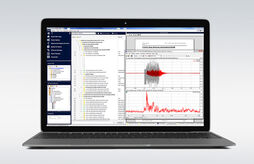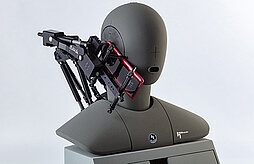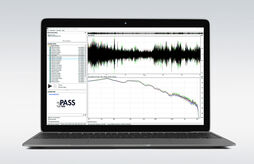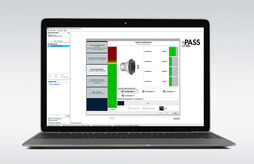ACQUA standards – Automated test suites for use with ACQUA

ACQUA standards provide complete implementations of all relevant international standards for example from 3GPP, ITU-T, ISO, IEC, ETSI, TIA, GCF, CTIA and GSMA for voice and audio quality. HEAD acoustics implements the ACQUA standards in databases for automated testing according to typical requirements. The test suites provide advanced testing methods and focus on all aspects of audio, voice and communication quality.
C.S0056 (3GPP2 C.S0056)
Code 6788
The tests implemented in the automated test suite C.S0056 cover all relevant electroacoustic performance aspects of CDMA2000® mobile terminals as specified by the 3GPP2 standard.
CAT-IQ 1.0 (DECT Forum CAT-iq 1.0)
Code 6793
The ACQUA standard CAT-IQ 1.0 covers tests for wideband NG-DECT terminals.
CAT-IQ 2.0 (DECT Forum CAT-iq 2.0)
Code 6794
The “Test Specification Audio for CAT-iqTM 2.0 Devices” is implemented as ACQUA standard CAT-IQ 2.0 for the communication analysis system ACQUA. The automated test suite CAT-IQ 2.0 enables manufacturers verifying that their products achieve excellent voice and audio quality required to successfully apply for the CAT-iqTM certification required by the DECT Forum.
CTIA SPTP-NB (CTIA Speech Performance Test Plan, Narrowband part)
Code 60060
The ACQUA standard CTIA SPTP-NB contains all speech quality measurements in the narrowband part for LTE, GSM / UMTS and CDMA terminal devices as defined and required by the CTIA in the document “Speech Performance Test Plan” version 2.1.1 from April 2019. The ACQUA standard allows manufacturers of LTE, GSM / UMTS and CDMA terminal devices to assess the minimum acoustic performance requirements.
UG CTIA SPTP-WB/SWB (CTIA Speech Performance Test Plan, Wideband and super-wideband ext.)
Code 60062
The ACQUA standard UG CTIA SPTP-WB/SWB covers all speech quality measurements for wideband and super-wideband LTE terminals. The automated test suite is implemented as defined and required by the CTIA in the document “Speech Performance Test Plan” version 2.1.1 from April 2019.
DTAG-Mobile-NB (DTAG Voice Quality Test Conditions for Narrow Band)
Code 60013
The ACQUA standard DTAG-Mobile-NB covers conformance tests of narrowband mobile terminals (handset, hands-free and headset modes) according to the DTAG test specification “Voice Quality Test Conditions for Narrow Band”. The automated test suite includes measurements for the analysis of delay, echo, speech transmission quality, quality during double talk, and quality of background noise transmission.
UG DTAG-Mobile-WB (DTAG Test Specification for Wideband Mobile Terminals)
Code 60014
The ACQUA standard UG DTAG-Mobile-WB covers conformance tests of wideband mobile devices (handset, hands-free and headset modes) according to the DTAG “Test Specification for Wideband Mobile Terminals”. The automated test suite covers e.g. delay measurements in sending and receiving direction, echo tests, evaluation of quality during double talk, quality of background noise transmission.
EG 202 518 (ETSI EG 202 518)
Code 60004
The ACQUA standard EG 202 518 for the ACQUA analysis system covers measurements for handset and headset terminal equipment according to the ETSI standard EG 202 518.
EN 50332 (EN 50332-1:2013, EN 50332-2:2013 and EN 50332:2017)
Code 6789
The ACQUA standard EN 50332 enables automated analysis of the maximum sound pressure level for headphones and earphones associated with portable audio equipment according to the European norms EN 50332-1:2013, EN 50332-2:2013 and EN 50332:2017.
ES 202 718 (ETSI ES 202 718)
Code 60033
The ACQUA standard ES 202 718 provides automated tests for narrowband and wideband home gateways according to ETSI standard of the same name.
ES 202 737/38 (ETSI ES 202 737 and ETSI ES 202 738)
Code 6795
The ACQUA standard ES 202 737/38 provides automated tests of narrowband VoIP terminals (handset, headset, loudspeaking, hands-free) from a QoS perspective as perceived by the user. ES 202 737/38 has been implemented according to ETSI standards ES 202 737 and ES 202 738.
ES 202 739/40 (ETSI ES 202 739 and ETSI ES 202 740)
Code 6796
The ACQUA standard ES 202 739/40 provides automated tests of wideband VoIP terminals (handset, headset, loudspeaking, hands-free) from a QoS perspective as perceived by the user. ES 202 739/740 has been implemented according to ETSI standards ES 202 739 and ES 202 740.
ES 203 038 (ETSI ES 203 038)
Code 6741
The ACQUA standard ES 203 038 provides automated analysis of analog phones (handset) according to ETSI standard ES 203 038.
G.168 (Recommendation ITU-T G.168)
Code 6750
The ACQUA standard G.168 provides the methods described in recommendation ITU-T G.168 for speech quality assessment of echo cancellers. The measurements in the automated test suite focus on delay, convergence, echo, and double talk performance.
GBT 15279 (GB/T 15279-94)
Code 6744
The ACQUA standard GBT 15279 covers acoustic measurements for analog telephones according to the Chinese specification GB/T 15279-94.
GOST 33468-NB (EASC Standard GOST 33468-2023)
Code 60030
The ACQUA standard GOST 33468-NB covers all requirements for communication quality in narrowband for emergency call (eCall) systems. The automated test suite is implemented according to the Euro-Asien Council for Standardization, Metrology and Certification (EASC) standard GOST 33468-2023.
UG GOST 33468-WB (EASC Standard GOST 33468-2023)
Code 60032
The ACQUA standard UG GOST 33468-WB covers all requirements for communication quality in wideband for emergency call (eCall) systems. The automated test suite is implemented according to the Euro-Asian Council for Standardization, Metrology and Certification (EASC) standard GOST 33468-2023.
GSMA HD Voice
Code 60018
The ACQUA standard GSMA HD Voice covers all acoustic performance aspects for mobile devices and headsets (narrowband, wideband) as specified in the minimum technical requirements for use of the HD Voice logo with LTE (Annex F) issued by GSMA. Thus, the ACQUA standard allows manufacturers to ensure that their product meets the specifications required for using the HD Voice logo.
GSMA HD Voice+
Code 60046
The ACQUA standard GSMA HD Voice+ covers all acoustic performance aspects for mobile devices and headsets (super-wideband and fullband) as specified in the minimum technical requirements for use of the HD Voice+ logo with LTE (Annex H) issued by GSMA. Thus, the ACQUA standard allows manufacturers to ensure that their mobile devices meet the specifications required for using the HD Voice+ logo with LTE.
HAC-Suite
Code 60021
The ACQUA standard HAC-Suite contains measurements according to the following hearing aid compatibility standards: FCC 47CFR CH.1 §68.316/317, ITU-T P.370, ETSI ES 200 381-1, TIA-1083-B and ANSI C63.19.
IEC 62820-1 (IEC standards 62820-1-1 and 62820-1-2)
Code 60057
The ACQUA standard IEC 62820-1 contains acoustic performance tests of building intercom systems and devices as well as IP-based intercom systems according to the IEC standards 62820-1-1 and 62820-1-2.
MS Teams
Code 60026
The tests implemented in the ACQUA standard MS Teams allow efficient, automated testing of communication devices for compliance with the ‘Microsoft Teams Audio Test Specification V5.0’.
P.1100 (Recommendation ITU-T P.1100)
Code 6797
The ACQUA standard P.1100 covers all test cases for narrowband car hands-free terminals according to recommendation ITU-T P.1100. The tests focus on all conversational speech quality aspects of car hands-free communication under silent conditions as well as with realistic background noise.
P.1110 (Recommendation ITU-T P.1110)
Code 6798
The ACQUA standard P.1110 covers all test cases for wideband car hands-free terminals according to recommendation ITU-T P.1110. The tests focus on all conversational speech quality aspects of car hands-free communication under silent conditions as well as with realistic background noise.
P.1120 (Recommendation ITU-T P.1120)
Code 60043
The ACQUA standard P.1120 covers all test cases for super-wideband and fullband car hands-free terminals according to recommendation ITU-T P.1120. The tests focus on all conversational speech quality aspects of car hands-free communication under silent conditions as well as with realistic background noise.
P.1140-NB (Recommendation ITU-T P.1140)
Code 60038
The ACQUA standard P.1140-NB covers all narrowband test cases for in-vehicle emergency call (eCall) systems according to recommendation ITU-T P.1140. The tests focus on all conversational aspects of in-vehicle emergency communication under silent conditions as well as with realistic background noise.
UG P.1140-WB (Recommendation ITU-T P.1140)
Code 60044
The ACQUA standard P.1140-WB covers all wideband test cases for in-vehicle emergency call (eCall) systems according to recommendation ITU-T P.1140. The tests focus on all conversational aspects of in-vehicle emergency communication under silent conditions as well as with realistic background noise.
P.1150 (Recommendation ITU-T P.1150)
Code 60058
The ACQUA standard P.1150 provides measurements to ensure a basic level of functionality of in-car communication (ICC) systems and devices according to recommendation ITU-T P.1150. The tests focus on system stability, listening effort, signal-to-noise ratio and speech quality under silent conditions as well as with realistic background noise.
P.381 (Recommendation ITU-T P.381)
Code 60005
The ACQUA standard P.381 is the full implementation of all measurements specified by recommendation ITU-T P.381 for testing wired headsets or headphone interfaces of digital mobile terminals.
Skype-AS (Skype Hardware Certification Specification)
Code 60000
The ACQUA standard Skype-AS comprises tests for Skype accessories and equipment with embedded Skype client like headsets, handsets, and speakerphones. Skype-AS allows conformance testing of their product according to Skype audio specifications.
TBR 10 (ETSI TBR 10)
Code 6711
The ACQUA standard TBR 10 contains measurements of DECT phones according to the ETSI standard TBR 10.
TIA-920.110-B (ANSI/TIA-920.110-B)
Code 60041
The ACQUA standard TIA-920.110-B covers automated measurements for digital interface communications devices with handsets according to the test specification ANSI/TIA-920.110-B.
TIA-920.120-B (TIA-920.120-B)
Code 60047
The ACQUA standard TIA-920.120-B provides the complete implementation of the international standard TIA-920.120-B. It enables testing of digital interface communications devices with speakerphones.
TIA-920.130-B (TIA-920.130-B)
Code 60049
The ACQUA standard TIA-920.130-B provides the complete implementation of the international standard TIA-920.130-B. It enables testing of digital interface communications devices with headsets.
TS 102 924/925 (ETSI TS 102 924 and ETSI TS 102 925)
Code 60035
The ACQUA standard TS 102 924/925 covers basic electro-acoustic performance aspects of super-wideband and fullband hands-free and headset terminals as specified by ETSI standards TS 102 924 and TS 102 925.
TS 103 640 (Tests for active noise cancellation headsets and other earphones)
Code 60069
The ACQUA standard TS 103 640 provides the complete implementation of ETSI test specification TS 103 640 for testing, comparison and experimental optimization of active noise cancellation (ANC) Headsets. The standard includes measurements of environmental noise isolation, audio playback quality and voice call communication.
TS 103 737/38 (ETSI TS 103 737 and ETSI TS 103 738)
Code 60019
The ACQUA standard TS 103 737/38 provides the complete implementation ETSI test specifications TS 103 737 and TS 103 738 for narrowband mobile and wireless handset and headset terminals with for example 2G, 3G, 4G, WiFi and Bluetooth© access.
TS 103 739/40 (ETSI TS 103 739 and ETSI TS 103 740)
Code 60020
The ACQUA standard TS 103 739/40 provides the complete implementation ETSI test specifications TS 103 739 and TS 103 740 for wideband mobile and wireless hands-free terminals with for example 2G, 3G, 4G, WiFi and Bluetooth© access.
TS 26 131-32 (3GPP TS 26.131 and 3GPP TS 26.132)
Code 6777
The ACQUA standard TS 26 131-32 provides the complete implementation of 3GPP standards TS 26.131 and TS 26.132 in narrowband and wideband for mobile terminals. Besides performance testing, the ACQUA standard TS 26 131-32 enables GCF/PTCRB conformance testing of mobile terminals.
UG TS 26 EL ITF Tests
Code 60065
UG TS 26 EL ITF Tests is an extension to the ACQUA Standard TS 26 131-32 (Code 6777). It provides electrical measurements for mobile terminal assessment according to 3GPP TS 26.131 and 3GPP TS 26.132 via digital and analog electrical interfaces. It does not require an acoustic measurement environment.
UG TS 26 SWB/FB (3GPP TS 26.131 and 3GPP TS 26.132)
Code 60028
The ACQUA standard UG TS 26 SWB/FB provides the complete implementation of 3GPP standards TS 26.131 and TS 26.132 32 for measurements of super-wideband and fullband mobile terminals.
TS 51.010 (3GPP TS 51.010)
Code 6742
The ACQUA standard TS 51.010 enables automated testing of mobile telephony devices according to 3GPP standard TS 51.010.
VDA-HFT (VDS Specification Version 1.6)
Code 6770
The ACQUA standard VDA-HFT covers all test cases for car hands-free terminals according to VDA specification version 1.6. The tests focus on all conversational speech quality aspects of car hands-free communication under silent conditions as well as with realistic background noise.
VFTST-Audio-NB (Vodafone Performance TST Audio Quality 3.0)
Code 60009
The ACQUA standard VFTST-Audio-NB allows conformance tests for narrowband terminals, hands-free and headsets according to the “Vodafone Performance TST Audio Quality 3.0”. VFTST-Audio-NB provides comprehensive tests for the analysis of for example delay, echo, speech transmission quality, and the Bluetooth® interface
Upgrade VFTST-Audio-WB (Vodafone Performance TST Audio Quality 3.0)
Code 60010
The ACQUA standard VFTST-Audio-WB is the optional wideband extension of VFTST-Audio-NB for the use with the communication analysis system ACQUA. VFTST-Audio-WB provides comprehensive tests for the analysis of for example delay, echo, speech transmission quality, and the Bluetooth® interface.
Zoom Audio
Code 60068
The tests implemented in the ACQUA standard Zoom Audio allow efficient, automated testing of communication devices for Zoom Meetings and Zoom Rooms, such as headsets, personal- and group speakerphones, pro-grade microphones, and installed conferencing systems according to Zoom Video Communications Inc. specifications.













